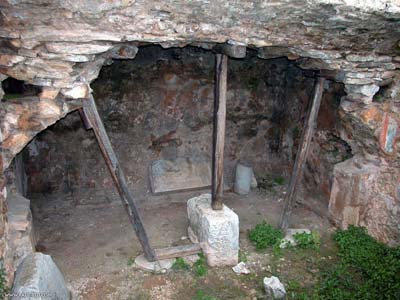Understanding Philippians
As a piece of theater, Prisoner of Joy is unusual because its script is taken, word-for-word, from the Bible. Using the book of Philippians with flashbacks to Acts chapter 16, the production brings to life the Word of God. But one might ask, why Philippians? What is so special about the church at Philippi? The answer can be found in the tone of Paul’s letter.

Throughout Paul’s letter to the Philippians, one can see the love he had for the church at Philippi. Written near the end of Paul’s two year Roman imprisonment (ca. A.D. 61), the letter has an overall joyful tone, and joy is a recurring theme. Paul was pleased with the work of this church, as it was actively engaged in supporting his work as a missionary. He encouraged them to grow in Christlikeness and to beware of false teachers. The Church today can use this same encouragement, can’t it?
In reading this letter, it is helpful to understand the history and culture of the city of Philippi. According to Acts 16:2, Philippi was a Roman colony, settled mainly by Roman army veterans after a major battle there which ended the Roman Republic and brought in the Empire. Because of this, the people there held strongly to their Roman citizenship and Roman pride. Paul refers to this civic pride when he describes Christians as citizens of Heaven (3:20).
Founded on Paul’s second missionary journey, the Philippian church was the first to take root in Europe. Generally, Paul’s first stop when he visited a city was the synagogue. However, it appears that the city had a very small Jewish population, as evidenced by the women meeting outside the city by a river to pray. At the time, ten Jewish men were required to form a synagogue. Paul preached to these God-fearing women, and Lydia was baptized. It is likely that the Philippian church met in her home after her conversion.

Because of the civic pride of the people, Roman customs were widely practiced – including that of fortune telling. Paul encountered this in the form of the demon-possessed slave girl. When the apostle cast the demon out, the people were enraged at the threat to their Roman customs. Paul and Silas were beaten and thrown in prison as a result, where an earthquake allowed the opportunity for Paul to share the gospel with the jailer and his family. The next day, the magistrates learned that Paul and Silas were Roman citizens, and as such had been illegally beaten and imprisoned. This time, the Roman law played in Paul’s favor, and he was released and asked to leave Philippi.
Paul would later revisit Philippi on his third missionary journey and the church continued to support him in his work with generous gifts. The church also sent large gifts for the needy in Jerusalem. While he was imprisoned in Rome, the Philippians sent another contribution, as well as a man named Ephaphroditus, who was to help Paul in his need. However, Ephaphroditus became very ill, to the point of death, and Paul decided to send him home carrying the letter.
